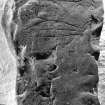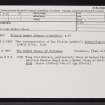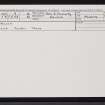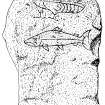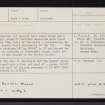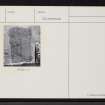Following the launch of trove.scot in February 2025 we are now planning the retiral of some of our webservices. Canmore will be switched off on 24th June 2025. Information about the closure can be found on the HES website: Retiral of HES web services | Historic Environment Scotland
Gairloch, Pictish Symbol Stone
Pictish Symbol Stone (Pictish)
Site Name Gairloch, Pictish Symbol Stone
Classification Pictish Symbol Stone (Pictish)
Canmore ID 11962
Site Number NG87NW 9
NGR NG 8075 7565
Datum OSGB36 - NGR
Permalink http://canmore.org.uk/site/11962
- Council Highland
- Parish Gairloch
- Former Region Highland
- Former District Ross And Cromarty
- Former County Ross And Cromarty
Gairloch, Ross and Cromarty, Pictish symbol stone
Measurements: H 0.97m, W 0.71m, D 0.12m
Stone type: Torridonian sandstone
Place of discovery: NG c 8019 7707
Present location: Gairloch Heritage Museum.
Evidence for discovery: it is said to have been found around 1880 at Auchtercairn north of Gairloch in a field in which a number of long cists were found and in which a large cairn once stood. It served as a sill stone in the doorway of an outhouse at Flowerdale House (NG87NW 34), until sometime in the first half of the twentieth century when it was placed in the parish church. In 1964 it was built into the south wall of the new cemetery, and in 1977 it was removed and taken to Gairloch Museum.
Present condition: very worn and broken at the top (and probably the base).
Description
One broad face of this very irregular slab is deeply incised with the lower part of an eagle above a salmon, both facing left.
Date: seventh century.
References: Stevenson 1954, 110-11; Fraser 2008, no 122.
Compiled by A Ritchie 2017
NG87NW 9 8075 7565
See also NG77NE 1.
Mr Bannerman (G Bannerman, District Surveyor, Gairloch, Wester Ross) reports that human bones and a Pictish symbol stone of Torridon sandstone were found about 1880 in 'The field of the cairn - Achtercairn, 'an almost flat arable field centred at NG 799 772. The symbol stone measures 36" by 20-24" by 5" and served as the step of an outhouse at Flowerdale House, until recently when it was placed in the Parish Church.
R B K Stevenson 1954.
In 1964 the Rev. D Macdonald had the symbol stone, which is incised with a fish and part of a goose, built into the south wall of the new cemetery at NG 8075 7565.
Surveyed at 1/2500.
Visited by OS (R D) 30 March 1965.
Now in Gairloch Museum.
Information contained in letter from A Jackson, 11 November 1985.
Class I symbol stone bearing an eagle over a salmon.
A Mack 1997.
A long-cist burial (for which see NG77NE 1) was excavated in 1949 at the head of Strath Bay, an inlet of Loch Gairloch, and about 25m W of Abhainn Achadh Chairn. Human remains and a symbol-stone had been found in the same area about 1880, and other burials have been found about 190m to the SE (1). The symbol-stone was used as a stair-tread in an outhouse at Flowerdale House until about 1950, when it was removed to the parish church. In 1964 it was incorporated in the entrance to the new cemetery that lies E of the old burial-ground (2), and in 1977 it was presented to Gairloch Heritage Museum.
The stone is a slab of Torridonian sandstone, 0.97m high by 0.71m in maximum width and 0.58m at the foot, measuring 0.12m in thickness. It is much worn and parts have been lost through flaking, especially at the top and left edge, but some of the irregularity of the surface seems to predate the carvings. At the top, and facing left, there is incised an eagle which has lost its head and back through flaking (3). Its feathered legs and wing are indicated, but there is little other surviving detail. Below this, and facing in the same direction, there is a well-drawn salmon, 0.46m long, with a crescentic tail and a dorsal and two lower fins.
Footnotes:
(1) R B K Stevenson 1954, 110; NMRS database NG77NE 1.
(2) NGR NG 8075 7565. The burial-ground that lies between the E shore of Loch Gairloch and the A 832 was the site of the medieval parish church, which was dedicated to St Maelrubha (J H Dixon 1886, 63, 69-70, 99; NMRS database NG87NW 2; A G and M H Beattie 1987, 28-31).
(3) This bird was identified as a goose by C Thomas (Archaeological Journal, 120 (1963), 94), but its tail, legs and feet closely resemble those of the eagle from Knowe of Burrian, Orkney (PSAS, 74 (1939-40), pl.13d; cf. D G MacLean 1985, 109-13; L Alcock 1998, 527).
R B K Stevenson 1954; A Mack 1997; L Alcock 1998; I Fisher 2001.












